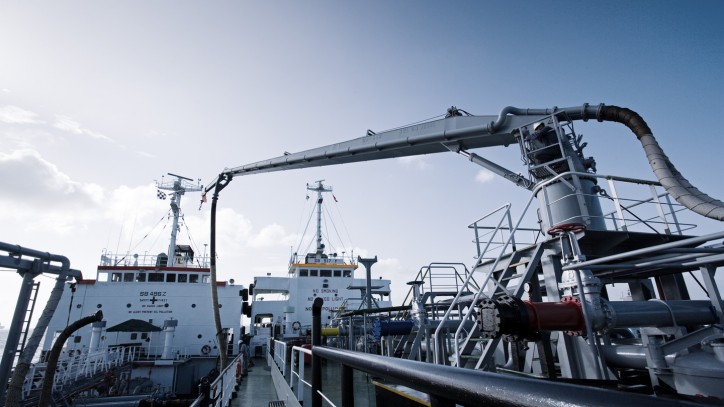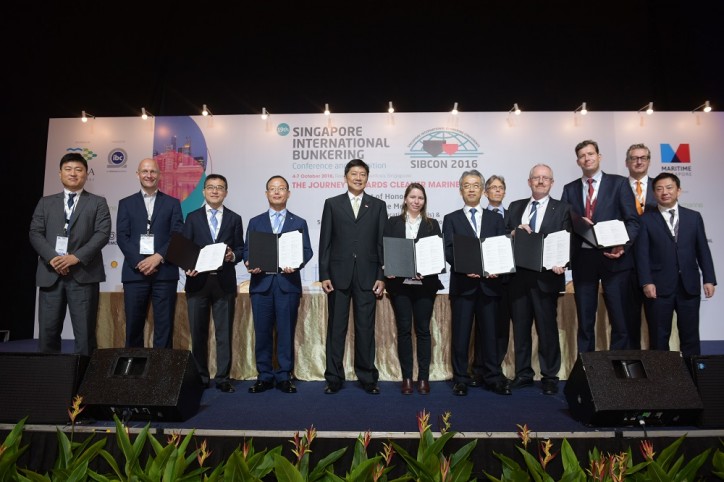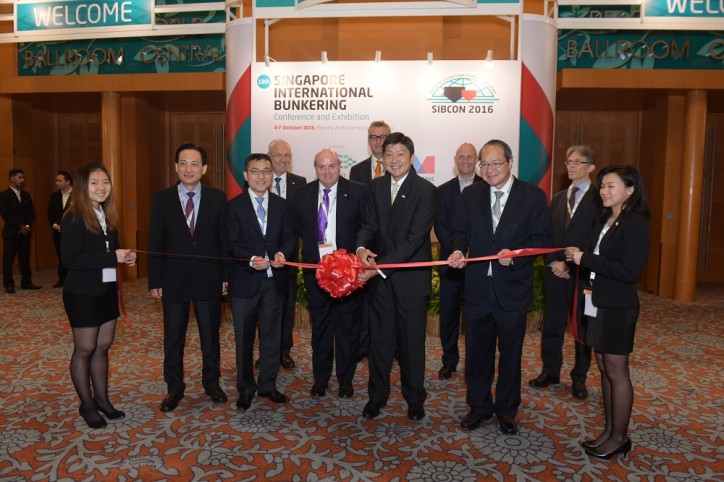Organised by the Maritime and Port Authority of Singapore (MPA), the Singapore International Bunkering Conference and Exhibition (SIBCON) has anchored itself as the world’s largest bunkering conference since its inception in 1988. Over the years, SIBCON has proven to be a distinctive think-tank, a unique platform that brings together leading bunkering professionals, academic experts and high-level industry executives.
In its 19th instalment, SIBCON 2016 will welcome more than 1,500 participants from over 50 countries who will expect to hear first-hand industry updates from key international speakers on the present and future directions of the bunkering industry.

Ship-to-Ship bunkering operation - Image courtesy: OW Bunker
Singapore’s Acting Minister for Education (Schools) and Senior Minister of State, Ministry of Transport, Mr Ng Chee Meng, presided over the opening ceremony held at the Resorts World Sentosa today.
This year’s SIBCON theme, “The Journey Towards Cleaner Marine Fuels” comes at an opportune time as the international regulatory landscape gravitates towards a framework in support of a sustainable global maritime transport system. As a result, it has become pressing for shipping companies, oil majors, bunker suppliers and other stakeholders to work together to develop cleaner fuel solutions for the future.
Today, MPA introduced several new initiatives at SIBCON as part of Singapore’s continued efforts to enhance bunkering processes and prepare the bunkering industry to meet future demands.
1. Leveraging Technology to Improve Bunker Deliveries
a) Mandatory adoption of Mass Flow Meters (MFM) for all bunker deliveries in the Port of Singapore
MPA previously announced the mandatory adoption of MFM for Marine Fuel Oil (MFO) deliveries in the Port of Singapore from 1 January 2017. MPA is on track for implementation with 110 bunker tankers already approved to perform MFO deliveries through MFM in the Port of Singapore.
More than 23 bunker tankers have also been scheduled for installation and testing over the next two months. Moving ahead, MPA will put in an additional S$0.5 million to fund the test-bedding of the use of MFM for Distillates deliveries. Trials have commenced and an update will be provided in the first quarter of 2017.
b) Increasing productivity in Singapore’s bunkering industry
With the introduction of electronic Bunker Delivery Notes (e-BDNs), important bunkering information can be transmitted almost instantaneously to both buyers and sellers. MPA has been conducting field tests on e-BDNs which will greatly improve the productivity of the industry as processes such as invoicing and payments will become more efficient. MPA will continue to work with the industry to roll out this initiative in 2018.
2. Preparing the Port of Singapore for LNG bunkering in the longer term
a) Working towards the launch of the LNG bunkering pilot programme in early 2017
MPA and Singapore LNG Corporation Pte Ltd (SLNG) signed a Memorandum of Understanding (MoU) today to collaborate on an interim truck loading facility, which will be used to service LNG bunkering. The facility will also be used to serve a variety of other industries that may require small volumes of LNG to be transported over land. MPA has committed up to approximately S$2 million to co-fund the development of this facility, which will be operationally ready by early 2017.
MPA is working with SPRING Singapore to develop the Technical Reference (TR) for Singapore’s LNG bunkering standards. This TR will be launched in early 2017, providing a reliable and transparent framework for LNG bunkering operations.
Of the S$12 million allocated for the co-funding programme for LNG-fuelled vessels, a total of S$8 million has been awarded to Harley Marine Asia Pte Ltd, Keppel Smit Towage Pte Ltd and Maju Maritime Pte Ltd. The types of vessels that will be built include tugboats and bunker tankers.
To encourage the uptake of LNG bunker by local harbour craft, MPA will waive five years of port dues for new LNG-fuelled harbour craft that register with MPA between 1 October 2017 and 31 December 2019. To complement this effort, MPA will also grant an additional 10% port dues concession for the Green Port Programme qualifying vessels that engage LNG-fuelled harbour craft for their port operations.
b) Forging partnerships to drive the LNG bunkering agenda globally
An international focus group was formed in 2014 to cooperate on LNG bunkering. MPA will now be expanding the original MoU, which initially comprised the ports of Singapore, Rotterdam, Antwerp and Zebrugee, to include the Port of Jacksonville, Norwegian Maritime Authority, and the Ministry of Land, Infrastructure, Transport and Tourism, Japan and the Ulsan Port Authority, Republic of Korea. The expansion of the focus group will be formalized through another MoU signed today. This MoU will deepen cooperation and information sharing in relation to LNG bunkering.
As the group works towards building a network of LNG bunker ready ports across the Asia-Europe shipping route, the increased representation of Asian ports will add impetus towards making LNG bunkering a reality in the future.
In addition to cooperation with ports, an inaugural LNG Bunkering Roundtable was held on 4 October in conjunction with SIBCON. The roundtable was attended by more than 80 senior executives from key organisations across the LNG bunkering value chain. Themed “Realising the Potential of LNG as a Marine Fuel”, the roundtable saw discussions on demand and supply, regulatory and infrastructural issues relating to LNG bunkering on a global perspective.
Mr Masamichi Morooka, President Yokohama Kawasaki International Port Corporation (YKIP) said, “Throughout the roundtable discussion, I was encouraged to learn that various projects for LNG bunkering infrastructures have been globally undertaken. In view of intensifying environmental regulatory requirement for ships, all stakeholders involved in the probable change in ships’ fuel to LNG need to move the projects forward by taking the necessary actions. The Port of Yokohama is fully committed to assist with facilitation of the environmental regulatory requirement.”
Mr. Andrew Tan, Chief Executive, MPA said, “As a leading global hub port and international maritime center, Singapore is committed to setting the highest standards for the bunkering industry as well as provide a broad range of solutions to meet the energy needs of the global shipping industry. While the International Maritime Organization (IMO) remains in the driver’s seat to accelerate the overall effort to reduce shipping emissions at the international level, port authorities also have an important role to play at the national level. MPA will continue to engage our key stakeholders to collectively raise standards, which will enable us to stay relevant in the global bunkering industry.”

Expansion of international focus group to cooperate on LNG bunkering - Photo: MPA

Opening of the 19th Singapore International Bunkering Conference and Exhibition - Photo: MPA
Source: MPA